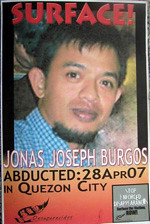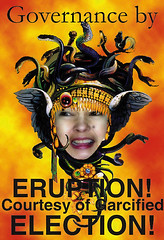Manila of our exile
Essay by Joel Pablo Salud
There is this sadness to cities far more debilitating than those felt only too deeply in the heart, and Manila’s exile into melancholy, with its rain-dusted roads and cooing sunrises along a misty, wind-swept bay, without exception, comes to mind.
In Manila of decades past, one may frame scenes of cold light winds that breeze effortlessly above cobblestones and bricks of red and grey, of scents from a neighbor’s rattan window of sinigang and tinola , awakening the senses, of ancient acacias and narras that line a Padre Faura empty yet still of flittering red bulbs, where children owe much of their fondest memories to a Manila Bay that hitherto dazzles with the confluence of shore, rock and ocean, of that certain distance Filipina mestizas and morenas flaunt their bubbly smiles behind slender sleeves, white petticoats, and the yellow-rose shadow of an opened avanico, torn between the world of Maria Clara of one hero’s day and the young, opalescent Gloria Romero of the pinilakang tabing, when the cool single fire of daybreak explodes spectacularly into pinpricks of pastel flames as evening falls—treasures now long lost to the tattered leaves of memory. It was a Manila ineffably childlike, triumphant in its small, first bopping steps, far removed from the city that haunts our dreams today—a grim, experienced and tempestuous Manila—a faint reflection of what the city ought to be after its many final attempts at being free.
When one thinks of Manila of today, a chill less likely to stir a tourist, let alone hold his or her attention, is felt; a supercilious aloofness made more pitiful by our all-too-human need to disavow it behind colored walls, glass-plated towers and a constellation of neon. At the very center of the city, within the iris of Luneta, the much-touted hospitality of Filipinos has lurched ever inward, absorbed in its own despair. What remains of the Rizal Park of yesteryears, when sprawling gardens and patches of lush greens were meant for family picnics of pan de sal and pansit, is the hideousness of steel fences, which alone can enjoy the warmth of the park’s earth and scent of leaves.
Daily we traverse its blacktopped asphalt with hardly any hope of reaching a destination. The delicate waltzes, marches and kundimans do not occupy the same place of renown at the derelict Metropolitan Theatre than they do now in our memory. Its dark hall is gagged ever in silence under the sloping, fleeting glances of passersby, wondering perhaps how a thing so brimming with tunes and melodies could singularly, finally empty itself of any song. We have yet to walk the streets of historic Malate, where unnamed heroes once strode the dusty paths, and look straight into the glossy eyes of street children as rumpled and bedraggled as only Famas could notice through rose-tinted reels. What we fail to see is that well into the precarious night, each homeless, famished child is absorbed into a constantly flickering blackness no glint of charity could ever absolve, no spark of rhetoric could ever dispel.
A couple of more paces into the inner city belly of Ermita, a girl remotely into her teens struggle incessantly with the meanness of our era, taking stock of her courage while in her sleep, and upon awakening in the thick of a mute, unadorned night, she once more prowls for an unsuspecting traveler. She has unwittingly turned into a predator for reasons that escape the mute and the blind among us. Scarcely to be traced are the contours of her once angelic face where behind each friendly smile a quivering hunger now lies in wait. She lurks and hankers under the pale glow of streetlamps, almost threadbare in her poverty, boredom and innocence, if not for the strip or two of self-respect that veil the little of what is left of her tenderness. And with scarcely the consolation needed to rise from the ruins of a decrepit childhood, she kneels at the altar at Baclaran with nothing but bated breath on her lips. She remains, as everything else destitute, the heiress of a heaven still yet to be claimed.
And there is the grandeur of history to reminisce, but have we really measured history the way we ought to? There’s nothing soft about the walled dungeons of Fort Santiago. If at all, it is the redecorated landscape that somehow shrouds, innocently, the clamped screams of unnamed prisoners who were chained and murdered behind its walls, cloaking, as it were, the ineffable pain of a cowed sense of existence. The low embrace of each strand of fresh Bermuda, the exotic desert palms, the elaborate fountain that crowns the center isle, the mute wind that tilts at each swirl of leaf and branch have contributed much to hiding its dark history under a shroud of attractions worth no more than a tourist’s styrofoamed meal. Such an impersonation of paradise, in fact, costs no more than the triviality it has evoked.
If anything, Fort Santiago is raw and harsh, remorseless and unforgiving, sharp as a blade at every turn, like the jagged rocks upon which it stands. Its ghosts groan as though they have lost their way in time, and while they try to make sense of the bows and twirls of its cobbled pathways, they make their way tortuously at each bend as if on the hunt for some frail and wounded promise of redemption. It has been hiding something amid the tourists and their laughter, something too awful for words, where, between the rocks each grain of sand stands as a mute witness. Suited neither for life nor an honorable death the inner fortress scarcely makes any incongruity between night and day. Time has stood eternally still between life beneath the eternal Pasig River and the scent of ruin behind the fort’s grim walls. Lest we lose the sense of ourselves, let us remember that Fort Santiago was a prison—Spain’s own rendering, in stone, of Dante’s Hell.
It is never easy to understand why something as historic and picturesque as the Manila of one hero’s day has wilted into the city of the poor man’s exile, having faded into a mere heartbreaking glance. For where the sky grows dull, they say, we can only expect the hiss of a storm. Yet even while suffused under a swathe of dark clouds, crimson stretch of horizon, and the muffled din of its unwashed youth on the streets, the Manila of our exile, for all the sway of regret that whistles in one’s ear, remains breathtaking in its melancholy. It is every bit as divine and neurotic as the darling cities of the world many a poor man’s son or daughter has yet to see. True, there is nothing in the least curative in our discoveries of corruption behind hallowed halls, the untold squalor that percolates in squatter communities a stone’s throw from the manors of Malacañan, the monotony within and beyond noontime entertainment and primetime operatic soaps, and the political oratory that barely leaves our taste buds with anything closely resembling the truth.
Yet in the blandness of it all Manila takes its place in the queue of cities as one uniquely rich in nostalgia as well as heroic tales: like that of the unknown laborer who sits by the bay alone, taking stock of what he has accomplished with blood and tears for so measly a pay. There’s the young and inexperienced nursing graduate, caught between eking out a living in the Philippines and discovering greener meadows elsewhere, who took a bigger chance at the wilderness of the Emirates as a domestic helper even while under the menacing risk of returning home in a cheap, wooden casket. Let us not forget the cultural dancers, those whose eyes distinctly suggest the Filipina’s gracefulness and beauty, so dogged by dearth into the flesh trade as to seem willing rather, whose only wreath upon returning home after a spell of years is the scorching rumors and scorn of gullible neighbors. Let us not even dare cross oceans where the bravest of our seamen run the daily peril of being fettered and murdered by pirates, if not the desperate of another, more wretched kind.
Others who continue their search for some modicum of relief within the tumbledown side of town do so only with a sequence of deep breaths, only to fail sadly, miserably, even at that. These are society’s castaways—dim, shadowy faces who have ceased being merely penniless as they are now among the nearly dead. Unheard behind the tireless roar of jeepneys is their tiny, smoldering voice. Their only hope of a mountain or sturdy roof to see, past the swarm of flies, are heaps of litter made all too delectable by their moldy rations of leftovers. Many lie naked and battered along the streets of Binondo and Quiapo under an equally naked sky, wriggling sleeplessly on the bloody hollow of Chinatown’s hand, warmed by nothing more than the skinny strip of cardboards on their backs, begging at the mud-spattered fringes of Plaza Miranda for as little as half a clutch of rice or noodles if only to avoid, for a day, a maggot-infested meal. They have remained indubitably nameless in a city that has seemingly turned against its own. But they are not mute, however breathless they seem to appear under a wisp of smog that is slowly clotting in their lungs. They speak, yes, even under the mistaken notion that there could be some who will lend their ears. But to convince the mind there is hope in so hopeless a clime, as some have said, belies every cloud that tends a silver lining. Many a fearless writer and journalist have served as their voice though an inexhaustible string of articles and essays like this one, but a word can only wager a few minutes of its life. Many writers, after all, are about as loud as the crumpled paper of their thoughts, as impoverished as the ruined among their topics.
This is not to say that Manila is less the affectionate mother in its efforts to provide an air of hope to those who have not escaped the intrusive poverty of the city. Manila, in spite of everything, is the fusion of its lights and the wealth of exploits of its people. A young, determined sun arrives quickly in the summer after a long, mulish dusk, drenching everything, even the unkempt corners of the city in dazzling light—a sign that hope, for it to be truly hope, must hope even against itself. Everything thereafter is left for destiny to carry out and discharge at will: a long-awaited letter, a Christmas bonus, a lotto win, a storybook beginning.
And if it happens that at some unknown and remote hour Manila seeks to be on a par with cities that have claimed—and claimed only proudly—eight million Filipinos as their own, then for all the tragedy of decades spent by our countrymen in exile abroad, Manila’s skies can once more offer a steady roof over their heads, the soft calm of its sunset as the wall that will cradle their tired bodies well into the quiet night.
Note: Manila of our exile was first published in Philippine Graphic magazine, “Dyip” photo courtesy of Andre Cawagas an artistic rendition that evokes hope.
*********************************************************************************
 Joel Pablo Salud started his career as a senior writer at The Manila Standard and The Manila Times nearly 21 years ago. He then on went to become the managing editor of Mabuhay magazine (PAL's inflight publication), People Asia (lifestyle glossy magazine) and The Philippine Graphic (news weekly and literary magazine).
Joel Pablo Salud started his career as a senior writer at The Manila Standard and The Manila Times nearly 21 years ago. He then on went to become the managing editor of Mabuhay magazine (PAL's inflight publication), People Asia (lifestyle glossy magazine) and The Philippine Graphic (news weekly and literary magazine).
He now writes freelance with Philippine Graphic and Philippines Free Press, and other publications, and helps out in the editing of the Graphic. He also contributes short fiction, and is in the middle of finishing a full-length novel, a short novel and a collection of short stories. He conducts writing workshops in leading universities in the Philippines, and writes a regular literary review column for The Manila Standard and the Philippine Graphic.
There is this sadness to cities far more debilitating than those felt only too deeply in the heart, and Manila’s exile into melancholy, with its rain-dusted roads and cooing sunrises along a misty, wind-swept bay, without exception, comes to mind.
In Manila of decades past, one may frame scenes of cold light winds that breeze effortlessly above cobblestones and bricks of red and grey, of scents from a neighbor’s rattan window of sinigang and tinola , awakening the senses, of ancient acacias and narras that line a Padre Faura empty yet still of flittering red bulbs, where children owe much of their fondest memories to a Manila Bay that hitherto dazzles with the confluence of shore, rock and ocean, of that certain distance Filipina mestizas and morenas flaunt their bubbly smiles behind slender sleeves, white petticoats, and the yellow-rose shadow of an opened avanico, torn between the world of Maria Clara of one hero’s day and the young, opalescent Gloria Romero of the pinilakang tabing, when the cool single fire of daybreak explodes spectacularly into pinpricks of pastel flames as evening falls—treasures now long lost to the tattered leaves of memory. It was a Manila ineffably childlike, triumphant in its small, first bopping steps, far removed from the city that haunts our dreams today—a grim, experienced and tempestuous Manila—a faint reflection of what the city ought to be after its many final attempts at being free.
When one thinks of Manila of today, a chill less likely to stir a tourist, let alone hold his or her attention, is felt; a supercilious aloofness made more pitiful by our all-too-human need to disavow it behind colored walls, glass-plated towers and a constellation of neon. At the very center of the city, within the iris of Luneta, the much-touted hospitality of Filipinos has lurched ever inward, absorbed in its own despair. What remains of the Rizal Park of yesteryears, when sprawling gardens and patches of lush greens were meant for family picnics of pan de sal and pansit, is the hideousness of steel fences, which alone can enjoy the warmth of the park’s earth and scent of leaves.
Daily we traverse its blacktopped asphalt with hardly any hope of reaching a destination. The delicate waltzes, marches and kundimans do not occupy the same place of renown at the derelict Metropolitan Theatre than they do now in our memory. Its dark hall is gagged ever in silence under the sloping, fleeting glances of passersby, wondering perhaps how a thing so brimming with tunes and melodies could singularly, finally empty itself of any song. We have yet to walk the streets of historic Malate, where unnamed heroes once strode the dusty paths, and look straight into the glossy eyes of street children as rumpled and bedraggled as only Famas could notice through rose-tinted reels. What we fail to see is that well into the precarious night, each homeless, famished child is absorbed into a constantly flickering blackness no glint of charity could ever absolve, no spark of rhetoric could ever dispel.
A couple of more paces into the inner city belly of Ermita, a girl remotely into her teens struggle incessantly with the meanness of our era, taking stock of her courage while in her sleep, and upon awakening in the thick of a mute, unadorned night, she once more prowls for an unsuspecting traveler. She has unwittingly turned into a predator for reasons that escape the mute and the blind among us. Scarcely to be traced are the contours of her once angelic face where behind each friendly smile a quivering hunger now lies in wait. She lurks and hankers under the pale glow of streetlamps, almost threadbare in her poverty, boredom and innocence, if not for the strip or two of self-respect that veil the little of what is left of her tenderness. And with scarcely the consolation needed to rise from the ruins of a decrepit childhood, she kneels at the altar at Baclaran with nothing but bated breath on her lips. She remains, as everything else destitute, the heiress of a heaven still yet to be claimed.
And there is the grandeur of history to reminisce, but have we really measured history the way we ought to? There’s nothing soft about the walled dungeons of Fort Santiago. If at all, it is the redecorated landscape that somehow shrouds, innocently, the clamped screams of unnamed prisoners who were chained and murdered behind its walls, cloaking, as it were, the ineffable pain of a cowed sense of existence. The low embrace of each strand of fresh Bermuda, the exotic desert palms, the elaborate fountain that crowns the center isle, the mute wind that tilts at each swirl of leaf and branch have contributed much to hiding its dark history under a shroud of attractions worth no more than a tourist’s styrofoamed meal. Such an impersonation of paradise, in fact, costs no more than the triviality it has evoked.
If anything, Fort Santiago is raw and harsh, remorseless and unforgiving, sharp as a blade at every turn, like the jagged rocks upon which it stands. Its ghosts groan as though they have lost their way in time, and while they try to make sense of the bows and twirls of its cobbled pathways, they make their way tortuously at each bend as if on the hunt for some frail and wounded promise of redemption. It has been hiding something amid the tourists and their laughter, something too awful for words, where, between the rocks each grain of sand stands as a mute witness. Suited neither for life nor an honorable death the inner fortress scarcely makes any incongruity between night and day. Time has stood eternally still between life beneath the eternal Pasig River and the scent of ruin behind the fort’s grim walls. Lest we lose the sense of ourselves, let us remember that Fort Santiago was a prison—Spain’s own rendering, in stone, of Dante’s Hell.
It is never easy to understand why something as historic and picturesque as the Manila of one hero’s day has wilted into the city of the poor man’s exile, having faded into a mere heartbreaking glance. For where the sky grows dull, they say, we can only expect the hiss of a storm. Yet even while suffused under a swathe of dark clouds, crimson stretch of horizon, and the muffled din of its unwashed youth on the streets, the Manila of our exile, for all the sway of regret that whistles in one’s ear, remains breathtaking in its melancholy. It is every bit as divine and neurotic as the darling cities of the world many a poor man’s son or daughter has yet to see. True, there is nothing in the least curative in our discoveries of corruption behind hallowed halls, the untold squalor that percolates in squatter communities a stone’s throw from the manors of Malacañan, the monotony within and beyond noontime entertainment and primetime operatic soaps, and the political oratory that barely leaves our taste buds with anything closely resembling the truth.
Yet in the blandness of it all Manila takes its place in the queue of cities as one uniquely rich in nostalgia as well as heroic tales: like that of the unknown laborer who sits by the bay alone, taking stock of what he has accomplished with blood and tears for so measly a pay. There’s the young and inexperienced nursing graduate, caught between eking out a living in the Philippines and discovering greener meadows elsewhere, who took a bigger chance at the wilderness of the Emirates as a domestic helper even while under the menacing risk of returning home in a cheap, wooden casket. Let us not forget the cultural dancers, those whose eyes distinctly suggest the Filipina’s gracefulness and beauty, so dogged by dearth into the flesh trade as to seem willing rather, whose only wreath upon returning home after a spell of years is the scorching rumors and scorn of gullible neighbors. Let us not even dare cross oceans where the bravest of our seamen run the daily peril of being fettered and murdered by pirates, if not the desperate of another, more wretched kind.
Others who continue their search for some modicum of relief within the tumbledown side of town do so only with a sequence of deep breaths, only to fail sadly, miserably, even at that. These are society’s castaways—dim, shadowy faces who have ceased being merely penniless as they are now among the nearly dead. Unheard behind the tireless roar of jeepneys is their tiny, smoldering voice. Their only hope of a mountain or sturdy roof to see, past the swarm of flies, are heaps of litter made all too delectable by their moldy rations of leftovers. Many lie naked and battered along the streets of Binondo and Quiapo under an equally naked sky, wriggling sleeplessly on the bloody hollow of Chinatown’s hand, warmed by nothing more than the skinny strip of cardboards on their backs, begging at the mud-spattered fringes of Plaza Miranda for as little as half a clutch of rice or noodles if only to avoid, for a day, a maggot-infested meal. They have remained indubitably nameless in a city that has seemingly turned against its own. But they are not mute, however breathless they seem to appear under a wisp of smog that is slowly clotting in their lungs. They speak, yes, even under the mistaken notion that there could be some who will lend their ears. But to convince the mind there is hope in so hopeless a clime, as some have said, belies every cloud that tends a silver lining. Many a fearless writer and journalist have served as their voice though an inexhaustible string of articles and essays like this one, but a word can only wager a few minutes of its life. Many writers, after all, are about as loud as the crumpled paper of their thoughts, as impoverished as the ruined among their topics.
This is not to say that Manila is less the affectionate mother in its efforts to provide an air of hope to those who have not escaped the intrusive poverty of the city. Manila, in spite of everything, is the fusion of its lights and the wealth of exploits of its people. A young, determined sun arrives quickly in the summer after a long, mulish dusk, drenching everything, even the unkempt corners of the city in dazzling light—a sign that hope, for it to be truly hope, must hope even against itself. Everything thereafter is left for destiny to carry out and discharge at will: a long-awaited letter, a Christmas bonus, a lotto win, a storybook beginning.
And if it happens that at some unknown and remote hour Manila seeks to be on a par with cities that have claimed—and claimed only proudly—eight million Filipinos as their own, then for all the tragedy of decades spent by our countrymen in exile abroad, Manila’s skies can once more offer a steady roof over their heads, the soft calm of its sunset as the wall that will cradle their tired bodies well into the quiet night.
Note: Manila of our exile was first published in Philippine Graphic magazine, “Dyip” photo courtesy of Andre Cawagas an artistic rendition that evokes hope.
*********************************************************************************
 Joel Pablo Salud started his career as a senior writer at The Manila Standard and The Manila Times nearly 21 years ago. He then on went to become the managing editor of Mabuhay magazine (PAL's inflight publication), People Asia (lifestyle glossy magazine) and The Philippine Graphic (news weekly and literary magazine).
Joel Pablo Salud started his career as a senior writer at The Manila Standard and The Manila Times nearly 21 years ago. He then on went to become the managing editor of Mabuhay magazine (PAL's inflight publication), People Asia (lifestyle glossy magazine) and The Philippine Graphic (news weekly and literary magazine).He now writes freelance with Philippine Graphic and Philippines Free Press, and other publications, and helps out in the editing of the Graphic. He also contributes short fiction, and is in the middle of finishing a full-length novel, a short novel and a collection of short stories. He conducts writing workshops in leading universities in the Philippines, and writes a regular literary review column for The Manila Standard and the Philippine Graphic.

POGB will not sell, exchange, use or allow any 3rd party access to your email for
any other purposes without exception, email exclusively for article updates only.

























0 Speak Out:
Post a Comment